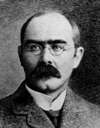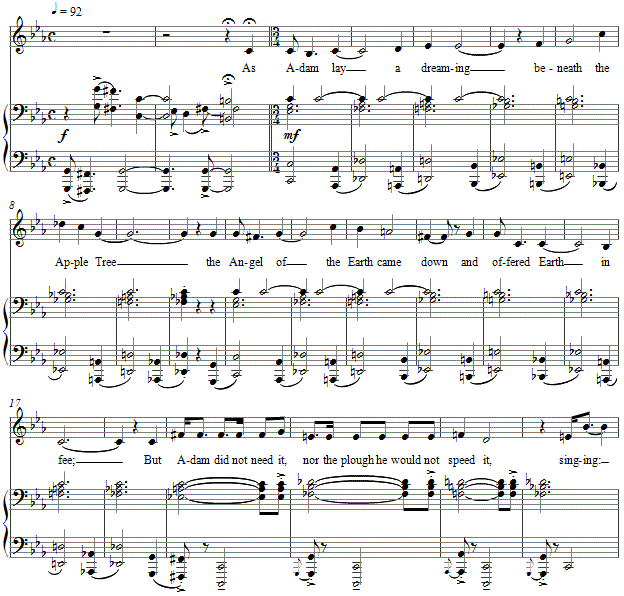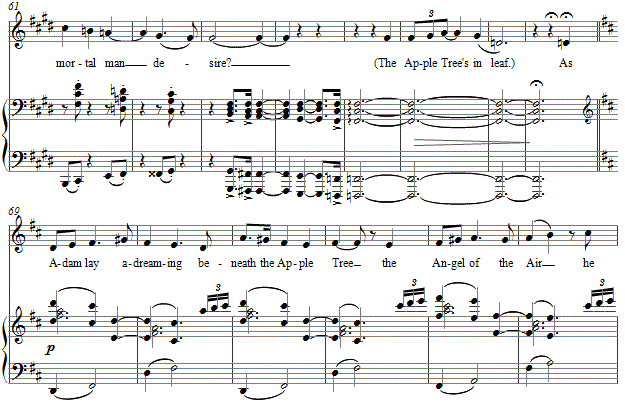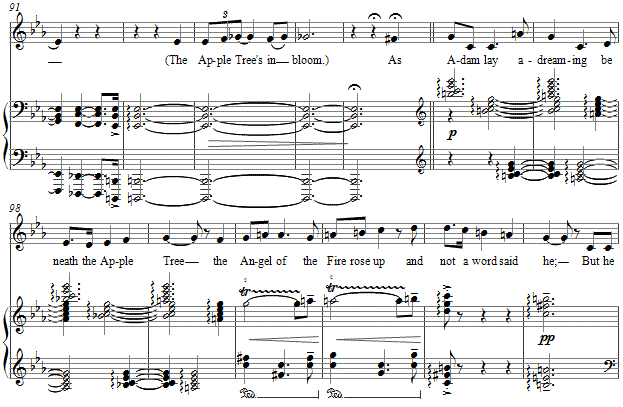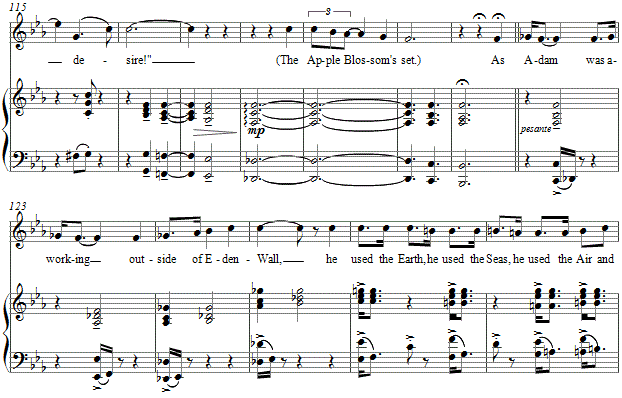Music and Texts of GARY BACHLUND
Vocal Music | Piano | Organ | Chamber Music | Orchestral | Articles and Commentary | Poems and Stories | Miscellany | FAQs
The Four Angels - (2011)
Rudyard Kipling
for mezzo soprano and piano
for Diana Hoy
As Adam lay a-dreaming beneath the Apple Tree
The Angel of the Earth came down, and offered Earth in fee;
But Adam did not need it,
Nor the plough he would not speed it,
Singing: --"Earth and Water, Air and Fire,
What more can mortal man desire?"
(The Apple Tree's in bud)
As Adam lay a-dreaming beneath the Apple Tree
The Angel of the Waters offered all the Seas in fee;
But Adam would not take 'em,
Nor the ships he wouldn't make 'em,
Singing:--"Water, Earth and Air and Fire,
What more can mortal man desire? "
(The Apple Tree's in leaf.)
As Adam lay a-dreaming beneath the Apple Tree
The Angel of the Air he offered all the Air in fee;
But Adam did not crave it,
Nor the flight he wouldn't brave it,
Singing: --"Air and Water, Earth and Fire,
What more can mortal man desire?"
(The Apple Tree's in bloom.)
As Adam lay a-dreaming beneath the Apple Tree
The Angel of the Fire rose up and not a word said he;
But he wished a flame and made it,
And in Adam's heart he laid it,
Singing: --"Fire, Fire, burning Fire!
Stand up, and reach your heart's desire!"
(The Apple Blossom's set.)
As Adam was a-working outside of Eden-Wall,
He used the Earth, he used the Seas, he used the Air and all;
Till out of black disaster
He arose to be a master
Of Earth and Water, Air and Fire,
But never reached his heart's desire!
(The Apple Tree's cut down!)[ 6 Pages, circa 5' 00" ]
Rudyard Kipling
The story of the garden, Adam and the angel with the flaming sword which guards against man's return is fleshed out with additional angelic characters by Kipling. Each brings of the four, earth, water, air and fire. Kipling shows man, with so many gifts and yet unable to reach "his heart's desire." For this, the reminder of this poem is a personal and individual reminder that we recall the "fire" in Adam's and everyman's heart still will not fire us to all our desires. For other settings of Kipling's texts, click here.
The five verse of the poem, with its technique of refrains, suggested its musical setting, in which three distinct gestures accompany each verse's text. From a statement in a large arch, to a more compact musical "irritation" of dissonant yet static harmonies followed by a jocular refrain -- at first. The second verse moves from C minor to C sharp minor.
The third verse breaks with the format lightly, moving to D major, Lydian colored, and accompanied in the upper register of the piano. This to receives the seemingly light-hearted refrain.
The fourth verse is accompanied with a more static setting, the blurring in the piano as only one note in four-note chords changes. The angel of fire "rises up" with trills, and the sequence thereafter follows the general scheme.
The fifth verse, in which dramaturgically Adam must struggle "outside of Eden-Wall," accompanies with slightly percussive gestures, as a denser underpinning to the voice intensifies the emotional reach. The refrain comes again, harder and a final, accelerating play off repeats Kipling's statement of reality, that man "never reached his heart's desire."
The score for The Four Angels is available as a free PDF download, though any major commercial performance or recording of the work is prohibited without prior arrangement with the composer. Click on the graphic below for this piano-vocal score.
